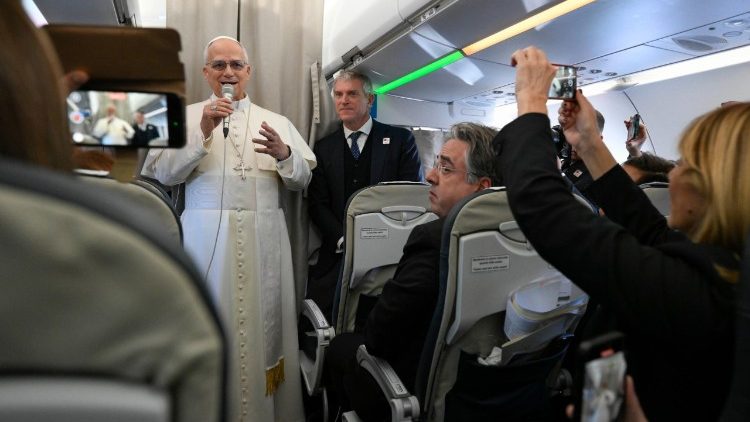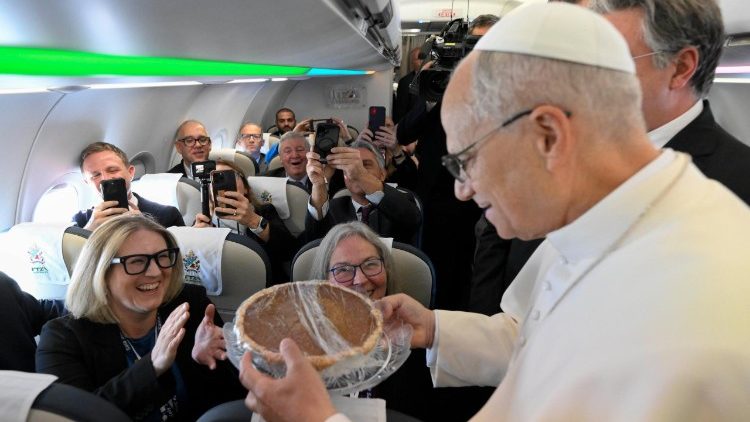Pope in Türkiye: calls for building bridges of fraternity and peace
The journey will take him from Istanbul to Iznik, where the Church marks the 1,700th anniversary of the First Ecumenical Council of Nicaea, and then, on Sunday, November 30, the Holy Father will travel to Lebanon.
The Pope was greeted by an official welcome ceremony at Ankara airport. (AFP photos)
________________
Pope Leo XIV landed in Ankara only a few hours ago, stepping onto Turkish soil and kicking off the first leg of his first Apostolic Journey, taking place from November 27 to December 3.
The journey will take him from Istanbul to Iznik, where the Church marks the 1,700th anniversary of the First Ecumenical Council of Nicaea, and then, on Sunday, November 30, the Holy Father will travel to Lebanon.
On Thursday Pope Leo kicks off the journey in Türkiye’s Presidential Palace and then at the Nation's Library, where authorities, civil society, and members of the diplomatic corps gathered to hear the Pope's first words during his initial Apostolic Journey abroad.
“A land that beckons humanity to fraternity”
Addressing Turkish President Recep Tayyip Erdoğan, Pope Leo expressed gratitude for the warm welcome extended to him. He spoke of Türkiye as a land “inextricably linked to the origins of Christianity,” yet also one that calls together all children of Abraham—Muslims, Christians, and Jews—to recognize difference not as division, but as a pathway to fraternity.

Pope Leo greets journalists aboard the papal plane bound for Ankara.
The Pope reflected on the natural beauty and rich cultural diversity of the country, describing them as reminders that human civilization flourishes where generations, ideas, and traditions meet.
Such diversity, he stressed, is not a threat but a safeguard of social vitality. “Uniformity would be an impoverishment,” he said, insisting that bridges—real and symbolic—are what sustain a truly civil society.
Bridge as a symbol of Türkiye’s vocation
The emblem chosen for the Pope’s journey depicts the bridge over the Dardanelles Strait. It is, the Pope said, a symbol of Türkiye’s unique identity: a nation physically connecting Asia to Europe, but even more profoundly, connecting itself—from east to west, from tradition to modernity, from difference to unity.
In a world strained by polarization and extreme positions, he warned, societies risk fragmentation.
Yet Christians in Türkiye, he affirmed, stand ready to contribute positively to the country’s unity, recalling the affection of Saint John XXIII, who once served here and urged Catholics to reject isolation and embrace a “culture of encounter.” Those words, the Holy Father noted, remain strikingly relevant today.
“God built a bridge between heaven and earth”
Pope Leo turned to the Gospel image of God as bridge-builder—God who, in revealing Himself, created a passage between heaven and earth so that hearts might learn to mirror His compassion.
Justice and mercy, he insisted, must challenge the logic of domination. Compassion and solidarity—not power—must be the true measures of development.
He warned of the dangers of technological progress detached from ethics, reminding his listeners that even artificial intelligence ultimately magnifies human choices.
“Processes are not the work of machines, but of humanity itself,” he said, urging leaders to work together “to repair the damage done to the unity of our human family.”
Family at the heart of Turkish society
Turning to a theme close to the hearts of many Turks, Pope Leo spoke of the family as “the first nucleus of social life,” the space where each person learns the essential truth that “without the other, there is no I."

He celebrated the country’s efforts to strengthen the role of the family, while also acknowledging the risks any family faces if it isolates itself or suppresses the voices of its own members.
Happiness, he said, does not come from individualism nor from scorning the bonds of marriage and openness to life.
He warned of consumerist cultures that turn loneliness into a commodity, urging instead “a culture that appreciates affection and personal connection”—a culture in which both conjugal love and the indispensable contribution of women are honoured.
Women, he affirmed, increasingly enrich the country through scholarship, professional life, public service, and cultural leadership.
Pope Leo expressed his hope that Türkiye may continue to serve as “a source of stability and rapprochement between peoples,” recalling the visits of Popes Paul VI, John Paul II, Benedict XVI, and Francis.
Visit carrying a message of unity and peace
Aboard the papal plane to Ankara, Pope Leo XIV interacted with over 80 journalists, who presented him with several gifts, such as a baseball bat, pictures of his time as a missionary, and a pumpkin pie.
“To the Americans here: Happy Thanksgiving!” said Pope Leo XIV as he appeared, smiling and waving, from behind the curtains that divide the different sections of the papal plane, around 20 minutes after takeoff from Rome's Fiumicino Airport.
“It’s a wonderful day to celebrate, and I want to begin by saying thank you to each and every one of you for the service that you offer to the Vatican, to the Holy See, and to my person, but also to the whole world,” he said to the over 80 journalists on board the flight to Ankara, the first stop of his first Apostolic Journey that will bring him to Türkiye and Lebanon from November 27 to December 2.
He described his Apostolic Journey to Türkiye and Lebanon as seeking to promote peace and unity.
“It’s so important today that the message be transmitted in a way that really reveals the truth and the harmony that the world needs,” he continued.
“In a special way, this particular trip to Türkiye and to Lebanon has, first of all, the very meaning of unity, celebrating 1,700 years from the Council of Nicaea.”